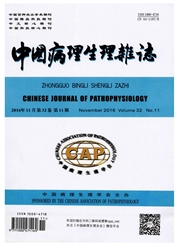

 中文摘要:
中文摘要:
目的:通过观察GDP对缺氧大鼠离体脑线粒体UCPs活性的影响,探讨UCPs活性改变在高原缺氧大鼠脑线粒体氧化磷酸化效能改变中的作用。方法:健康成年SD大鼠随机分为对照组、急性缺氧组和慢性缺氧组,分别于模拟海拔5000米高原环境连续缺氧暴露0d、3d和30d,分离脑线粒体,通过体外GDP干预后采用[^3H]-GTP结合法测定UCPs的活性(以Scatchard作图法计算两者结合的解离常数Kd和最大结合量Bmax),采用Rhodamine123法和Clark氧电极法分别测定线粒体膜电位(MMP)和线粒体呼吸氧耗。结果:急、慢性缺氧使大鼠脑组织线粒体UCPs与[^3H]-GTP的最大结合量(Bmax)均显著升高,而解离常数(Kd)、线粒体膜电位(MMP)和呼吸控制率(RCR)均显著降低,但解偶联呼吸氧耗增加。给予GDP干预后,各组UCPs的活性均被显著抑制,表现为K升高,Bmax降低;而MMP和RCR则升高,其中急性缺氧组的变化最显著。结论:模拟高原缺氧条件下GDP能通过抑制UCPs的活性提高大鼠脑线粒体呼吸活性和膜电位,提示UCPs的活性改变是高原缺氧条件下脑线粒体氧化磷酸化效率改变的原因之一。
 英文摘要:
英文摘要:
AIM: To observe the effect of GDP on uncoupling proteins (UCPs) activity and the efficiency of oxidative phosphorylation in hypoxic exposed rat brain mitochondria. METHODS : Adult SD rats were randomly divided into three groups (control, acute hypoxia and chronic hypoxia groups). The animals were placed into a hypobaric chamber simulated 5 000 m high altitude for 0, 3 and 30 d, respectively. The mitochondria from rat brain were isolated by centrifugation. The activity of UCPs was detected by the method of [ H^3 ] - GTP binding with UCPs specifically. The maximal binding content ( Bmax ) and the dissociation constant ( Kd ) were determined by Scatchard plot. The mitochondrial potential was measured by rhodamine 123 method. Oxidative respiratory consumption was measured by Clark electrode. The experiments were conducted under the conditions with or without GDP (1 mmol/L) , respectively. RESULTS: For exposed to hypoxia, Bmax and the oxidative consumption of uncoupling respiration were increased. Kd, MMP and RCR were decreased. UCPs activity was inhibited by GDP in three groups. Kd was increased 61.01%, 83.13% and 71.52% and Bmax was decreased 23. 18%, 35.20% and 33.38% , respectively. The values in the acute hypoxie group were changed markedly. The sensitivity of UCPs to GDP was elevated significantly by hypoxia. With the reducing of UCPs activity, oxidative consumption of uncoupling respiration was decreased whereas RCR and MMP were increased. The results elucidated increase in the efficiency of oxidative phosphorylation. CONCLUSION: GDP increases the mitochondrial membrane potential and decreases the oxygen consumption of uncoupling respiration in hypoxic exposed rat brain mitochondria by inhibiting UCPs activity. The results suggest that the change in UCPs activity is one of the factors of mitoehondrial dysfunction in oxidative phosphorylation induced by hypoxia.
 同期刊论文项目
同期刊论文项目
 同项目期刊论文
同项目期刊论文
 期刊信息
期刊信息
